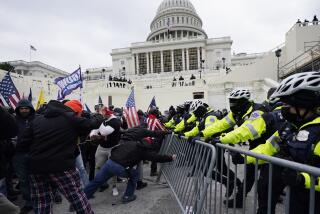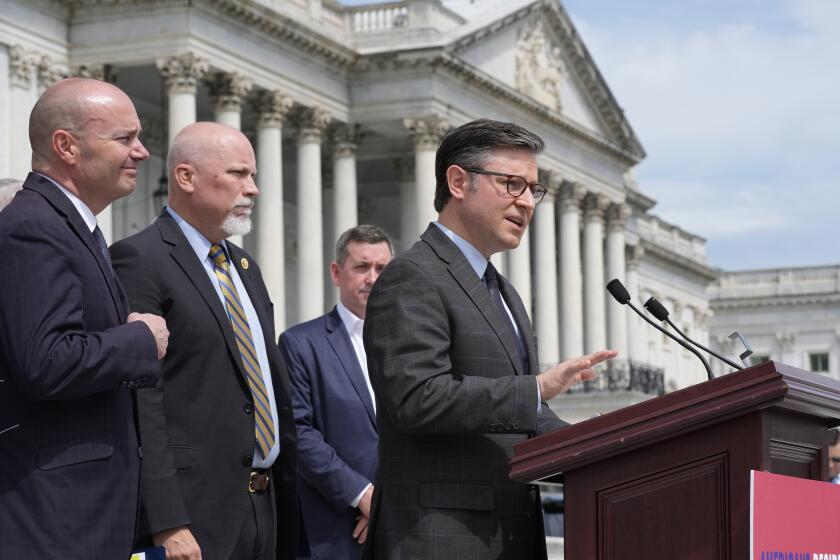Pentagon Issues Changes to Policy on Gays
The Pentagon on Tuesday issued what it called minor changes in its “don’t ask, don’t tell” policy on homosexuals in the military, but gay activists called the revisions an acknowledgment of the flaws of the controversial 4-year-old system.
After a year’s study by an internal group, Defense Secretary William S. Cohen ordered five changes intended to ensure that the military hierarchy fully understands the complex system and to guarantee that its implementation does not violate privacy or other rights.
The changes were contained in a Pentagon report that showed a steady increase in the number of service members discharged for homosexuality since the military’s “don’t ask, don’t tell” policy was implemented in 1994. The numbers rose from 617 in 1994, to 850 in 1996 and to 997 in 1997.
While insisting that the system works overall, Cohen acknowledged that some commanders “haven’t gotten the message.”
The policy, worked out amid scalding controversy in the opening months of President Clinton’s first term, is designed to prohibit homosexual activity in the military while barring routine investigations in hopes of protecting personnel who want to keep their sexual orientation to themselves.
But advocacy groups have complained that military commanders do not understand the policy and overstep its limits on investigating alleged homosexual conduct in the ranks.
The new rules:
* Call for commanders to check first with higher authorities before beginning an investigation of a service member’s alleged homosexual activities.
* Require that military investigators, attorneys and commanders be given more training to ensure that they understand the policy’s purpose and nuances.
* Call for guidelines to make clear that anyone who accuses another service member of homosexuality simply to harass him or her may be investigated and punished for sexual harassment.
* Generally discourage pretrial agreements in which criminal defendants are offered more lenient sentences in return for blowing the whistle on homosexuals in the ranks.
* Generally discourage authorities from investigating personnel who are seeking discharges because they are gay. In some cases, commanders have launched such inquiries to determine whether those seeking discharges are claiming homosexuality to avoid a dangerous deployment or to leave the service and avoid repaying medical or law school tuition.
In a few such cases, Cohen’s committee found, investigations of apparent bad faith are justified. But for the most part, such investigations risk violating privacy rules and are not justified, it concluded.
“Basically, it’s a firmer adherence to rules designed to protect people’s privacy,” said Kenneth H. Bacon, the chief Pentagon spokesman.
The anti-harassment policy was intended to respond to complaints that men have accused women of being lesbians after their advances were spurned. Officials said the rules are designed to make clear that allegations of homosexuality intended to harass women are unacceptable, though they said they had found few such cases.
Anyone who makes accusations of homosexuality to harass others may end up being investigated themselves, Cohen said in an interview with National Public Radio.
According to gay advocates, the new rule regarding pretrial agreements grew out of their complaints about an airman in Hawaii accused in 1996 of raping another man. The airman had his sentence reduced in a pretrial agreement after he turned in the names of 17 service members who allegedly committed consensual homosexual acts.
Cohen’s study committee decided that, while such plea agreements do not violate Pentagon policy, they are unwarranted because homosexual conduct cases do not warrant criminal prosecution. Thus, such plea bargains are “inappropriate in most cases,” the committee said in a 16-page report analyzing how the military has carried out the “don’t ask, don’t tell” policy.
The committee found that authorities had violated the rules in three cases but provided no details on the violations.
David M. Smith of the Human Rights Campaign, a gay-rights advocacy group, said that the new rules represent the “modicum of something positive.”
“They are clearly putting commanders on notice that they must adhere to this policy,” he said. Nonetheless, he said, these “limited steps” represent “an effort to cover up the fact that these witch hunts are still occurring.”
He cited the case of Timothy R. McVeigh, the former chief enlisted man on a submarine who was removed from his job after the Navy tracked down Internet information that authorities believed showed he was soliciting men for homosexual sex. A federal court has found the Navy’s action illegal and ordered McVeigh’s reinstatement.
Michelle Benecke, co-director of the Service Members Legal Defense Network, said the five changes show that “there is a problem. . . . We maintain that the core is an anti-gay bias in the military and that continues to go unaddressed.”
More to Read
Start your day right
Sign up for Essential California for news, features and recommendations from the L.A. Times and beyond in your inbox six days a week.
You may occasionally receive promotional content from the Los Angeles Times.







